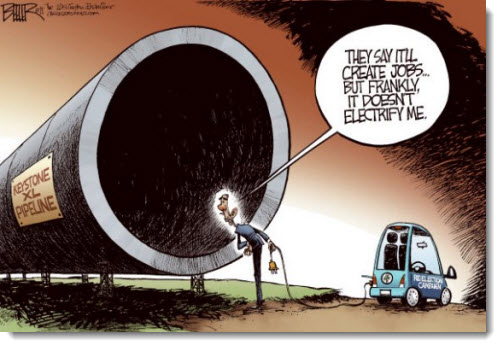Based on the supportive findings of a final environmental impact report, the Keystone XL pipeline should be a done deal. But the U.S. State Department left itself plenty of room Friday for President Barack Obama to say no.
If project backers, from proponent TransCanada Corp. to the governments of Canada and Alberta, worry the goal posts have again been moved, it sure feels like they have.
The message the U.S. administration appears to be sending:
It doesn’t matter whether a project meets — indeed exceeds — its criteria. What matters is how it fits into the president’s ambition to be seen as a leader in international climate action.
As widely expected, State’s long-delayed Final Environmental Impact Statement found the oil sands pipeline from Alberta to Texas would have minimal impact on the climate, clearing the president’s latest test and validating what proponents have been saying all along.
It found that if the project were denied, resulting in continued increase in oil transportation by rail, GHG emissions would rise considerably.
“Approval or denial of any one crude oil transport project, including the proposed project, is unlikely to significantly impact the rate of extraction in the oil sands or the continued demand for heavy crude oil at refineries in the United States based on expected oil,” the report said.
But during a press briefing immediately after the report’s release, Kerri Ann Jones, assistant secretary of State for oceans and international environmental and scientific affairs, made it clear the project’s fate lies in the next phase of the review.
It will determine whether the project is in the national interest and consider broader issues — including whether it fits into Obama’s climate change goals.
“We do have to take this work … and look at it against the broader question about where this project fits in our national and international efforts to address climate change and foreign policy and energy security,” Ms. Jones said.
“Given the priority that climate is for President Obama and Secretary [John] Kerry and the U.S. in general, that is certainly a key consideration.”
State also gave itself plenty of discretion to continue to delay a decision by giving no deadline for a presidential ruling.
Eight federal agencies have 90 days to give their views to the State Department. At the same time, the public will have a further 30 days to comment on the final review, even though the project generated 1.5 million public comments over the past year — 99% from the environmental lobby — thereby ensuring Keystone XL remains a platform for climate change debate heading into the mid-term elections.
It’s no wonder that KXL opponents felt encouraged by the review’s results, even as it debunked most of their exaggerated claims.
The report confirmed the project would be a major job creator — supporting 41,500 construction jobs and US$2-billion in earnings throughout the United States. It confirmed that oil pipelines are less risky than rail transportation, and that rail will likely be able to accommodate new oil sands production if new pipelines are delayed or not constructed.
“The fight is far from over,” Keystone foe and billionaire climate activist Tom Steyer said in a statement.
“I remain hopeful that the President will, in fact, apply the test for Keystone he established in his speech at Georgetown University: That the project cannot be approved if it increases the amount of carbon pollution being put into our air, which it does. I trust the President is aware of the opportunity for America to show leadership on this critical issue, and that he will be mindful of the importance of doing right by our children by tackling climate change head on.”
Meanwhile, proponents reacted with impatience at the prospect of more uncertainty.
“President Obama is out of excuses,” said U.S. House Speaker John Boehner. “The fact that he has let a final decision on the Keystone pipeline project — and the more than 100,000 jobs that come with it — languish for more than five years is economic malpractice.”
John Hoeven, Republican senator for North Dakota, said the document gives the president no reason to deny the pipeline’s approval.
“Although not explicit, this finding is consistent with four previous findings that affirm the need to begin construction without delay,” Mr. Hoeven said.”On the other hand, the report is vague and provides no timeline for a final decision, giving the president broad room to postpone a decision further.”
Keystone pipeline should be done deal — but there’s still plenty of room for Obama to say no


























Laissez un commentaire Votre adresse courriel ne sera pas publiée.
Veuillez vous connecter afin de laisser un commentaire.
Aucun commentaire trouvé